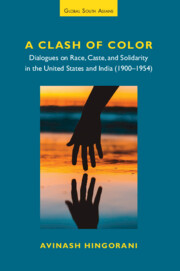 A Clash of Color
A Clash of Color Published online by Cambridge University Press: 28 November 2024
After Rai returned to India in December 1919, he sought to apply what he had learned in America to his own activism in India. Inspired by the Rand School of Social Science, Rai formed the Tilak School of Politics in 1921 to educate underprivileged Indians. He also started his own newspaper, The People, to circulate his ideas on caste and racial science, and his opinions on Gandhian non-violence tactics. Rai's views regarding the effectiveness of Gandhian techniques evolved throughout the 1920s. At the start of the decade, he supported Gandhi's non-violence strategy. However, Rai questioned passive resistance as a viable method for overthrowing White supremacy and the British Raj following the failure of the non-cooperation movement in 1922 and his exposure to Du Bois's articles in The Crisis describing the mass lynchings of Black Americans in the 1921 Tulsa race massacre. Rai came to see violent encounters as an inevitability during social clashes predicated upon race and class. Sadly, this violence came to claim Rai's life. On October 30, 1928, Rai himself led a protest against the British to challenge their lack of inclusion of Indians on the Indian Statutory Commission, which was a group of seven White British members of parliament chosen by the British government to study constitutional reform in India. During the protest, British police superintendent James A. Scott ordered the police to attack the protesters and Scott personally assaulted Rai. Rai died a month later, never recovering from the injuries inflicted upon him.
Up until his death, Rai's outlook continued to evolve. Alongside his thoughts on violent protest, his perception of caste changed throughout the 1920s. While Rai saw India's caste problem as a secondary issue early in the decade, by the tail end of his life, Rai had brought the matter to the forefront of the Indian independence movement. He actively sought the abolition of caste discrimination and sub-castes even to the point that he considered postponing Swaraj to solve the issue of caste. This showed that Rai actively sought caste reform and advocated for the abolition of sub-castes. In the many articles that Rai wrote in The People, he condemned caste discrimination explicitly and stressed that India could never achieve unity and become a functional democracy so long as caste discrimination remained.
To save this book to your Kindle, first ensure no-reply@cambridge.org is added to your Approved Personal Document E-mail List under your Personal Document Settings on the Manage Your Content and Devices page of your Amazon account. Then enter the ‘name’ part of your Kindle email address below. Find out more about saving to your Kindle.
Note you can select to save to either the @free.kindle.com or @kindle.com variations. ‘@free.kindle.com’ emails are free but can only be saved to your device when it is connected to wi-fi. ‘@kindle.com’ emails can be delivered even when you are not connected to wi-fi, but note that service fees apply.
Find out more about the Kindle Personal Document Service.
To save content items to your account, please confirm that you agree to abide by our usage policies. If this is the first time you use this feature, you will be asked to authorise Cambridge Core to connect with your account. Find out more about saving content to Dropbox.
To save content items to your account, please confirm that you agree to abide by our usage policies. If this is the first time you use this feature, you will be asked to authorise Cambridge Core to connect with your account. Find out more about saving content to Google Drive.